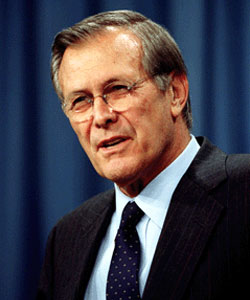Cheney is Vice President, Rumsfeld is Secretary of Defense, Libby WAS Cheney's Chief of Staff until he resigned in 2005, Armitage was Colin Powell's deputy Secretary of State, Dobriansky is Under Secretary for Global Affairs, Bolton is US Ambassador to the United Nations, Perle was a key member of the Defense Policy Board, and Wolfowitz, currently head of the World Bank, was Rumsfeld's Deputy at Defense for four years until 2005.
Most of these people are at the sharp end, the world shapers, the big guns of American politics who between them play, or have played, a significant role in shaping US policy and particularly foreign policy. Most had significant roles to play during the planning stages of the Iraq invasion which has proved to be such a disastrous piece of political misjudgment on just about every level....maybe.
Second Answer; What links these people in a more significant way than simply the responsibilities of high office is that all of them are members of the right wing think tank called the Project for the New American Century. It is the views of this organisation which shaped the early years of George W Bush's administration and it is the tenets that this group holds so dear which dominated the thinking of Cheney and Rumsfeld and which, indirectly, has led to the situation in Iraq and a sharp decline in the perception of the United States world wide as a force for good in the world.

PNAC's website states that its beliefs are:-
1. "American leadership is good both for America and for the world"
2 "Such leadership requires military strength, diplomatic energy and commitment to moral principle"
3 "too few political leaders today are making the case for global leadership."
It states its aims to be:-
A significant increase of US military spending.
Strengthening ties with US allies and challenging regimes hostile to US interests and values.
Promoting the cause of political and economic freedom outside the US.
Preserving and extending an international order friendly to US security, prosperity and principles.
In September 2000, two months before George W Bush won the Presidential Election, PNAC released a 90 page document which stated clearly that America should seek to preserve and extend its global leadership by maintaining the pre-eminence of American forces. It argues that diplomacy and sanctions should have a limited life span and that if enemy states do not concur within an American time frame, the US should not shrink from taking military action.
Although Republicans have traditionally favoured a strong military there is little doubt that what was being proposed here was a significant advance on that, to an America which was prepared to aggressively do more than just flex a few muscles whenever its interests are threatened. It's no longer simply saying that the US should be interventionist when necessary but that the US should aggressively use its military strength to shape a new world order with America its moral guide and mentor.
When Bush won the election in November, he and Cheney filled many of the key positions in the American government with PNAC members and they immediately began to work on the blueprint they had proselytised from their inception.
What would have happened without the tragedy of 9/11 is anybody's guess but for the architects of the new blueprint it was heaven on a plate - a real live threat to America's security on which this new aggressive American military strategy could be unleashed. First Afghanistan, for which there was some considerable world sympathy at the time, then the showpiece war where Donald Rumsfeld's 'shock and awe' tactics would see Iraq on its knees in days. Well we all know whats happened since.
However for those who favoured the PNAC doctrine is it all bad news? Probably not, for despite over 3000 US and allied forces killed and God knows how many Iraqis, America has got its hands on Iraq's sumptuous oil supplies, which, if not the prime reason for the war, was certainly a high priority for those US troops who trampled unwittingly over sites of tremendous historical value causing untold and irredeemable damage, their goal only to secure the oil installations and related buildings.
Back in the days when the Republican Party had some decency, Dwight D Eisenhower preached against the evils of what he termed 'the Military-Industrial complex' where there is a close and unhealthy relationship between the nation's military, its arms suppliers and other commercial interests which would benefit from conflict. President Eisenhower's warnings fell on deaf ears and have come home to roost under the current Administration whose Vice President was once Head of Halliburton Energy Services, the Company which has probably been one of the biggest profiteers from the invasion of Iraq. Cheney has ostensibly no current links with Halliburton, having received a multi million dollar severance package when there became a 'conflict of interests' but excuse me if my cynicism starts to show.

Another Company high on the profits list from America's aggressive new military policy is Carlyle Industries which owns defence contracting and military supply companies, and has had as serving directors or consultants both the George Bushes and Donald Rumsfeld.

It doesn't take rocket science to see a clearly dangerous link between political decision making and US company profiteering and there is no doubt that the war in Iraq, though disastrous in its execution and political aftermath has made a lot of Americans at the top of that politico-military- industrial complex very rich indeed.
And now we have North Korea and Iran, both having developed a nuclear capability with some considerable haste since the invasion of Iraq - which many American pundits,as well as my friend Ira in a comment, have pointed out. The US invaded the one country in Bush's 'axis of evil' which actually had no nuclear capability and was not developing one,thus alerting the other two to become nuclear capable pretty damn quick.
Bush has, since the Iraq War, replaced many of his PNAC people with 'non believers' but the eminences-grises of the philosophy, Cheney and Rumsfeld, remain in high office with a great deal of influence. Whatever were the high moral intentions of the PNAC philosophy contained in their: 'Such leadership requires military strength, diplomatic energy and commitment to moral principle' has withered and died as far as Iraq is concerned with an illegal invasion, followed by the shame of Guantanamo, Abu Ghraib and other abuses of decency and human rights that have followed this war around. Now Bush has enacted a law which enables non citizens to be treated outside the rules of the Geneva Convention...in other words, tortured.
America has, quite clearly, become mired in not just a failed war, but a failed political philosophy too, for one of its clear priorities is 'regime change' right across the globe, interfering in every state in which it feels American interests are not being served. This is arrogant, misjudged and highly dangerous for people are not going to lie down to have the American way of life imposed on them. This is apparent from the powerful insurgency in Iraq and from the increased militancy of Islamic groups all round the world to which America was always a hate figure but now Bush has given them a powerful focus.
I can only hope that, before 2008, the United States can find a Democrat strong enough to carry a broad swathe of public opinion and who has principles which can restore the country to the level of respect throughout the world which it used to earn, and who can put these hideous Bush years behind it. The United States needs to return to a policy of measured interventionism, and, more practically, start finding positive solutions to problems like the Palestinian issue which Bush has neglected shamefully. This commitment to changing governments by force if they don't fit the criteria of United States interests has to be abandoned in favour of something more far sighted, and maybe, hopefully, the US will regain some world respect and cease to be the pariah it has become during this failed Administration.

1 comment:
What do the following Americans have in common?- Richard Cheney, Donald Rumsfeld, Lewis Libby, Richard Armitage, Paula Dobriansky, John Bolton, Richard Perle, Paul Wolfowitz.
Among other things (with the exception of Rumsfeld), none served in the military.
When Bush won the electioni>
Well, this false premise mars an otherwise trenchant analysis! :-)
...
When Bush won the election in November,<
Post a Comment